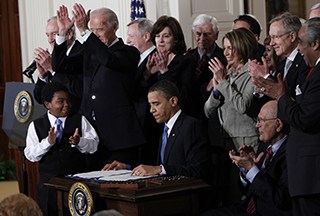


It’s important to remember that Proposition 2, the Obamacare Medicaid expansion, contains actual words. Words have meanings. Meanings have consequences.
If Medicaid expansion is bad, Proposition 2 is worse because of how it is worded: Prop 2 would give immense power to federal politicians and bureaucrats over Idaho. Said federal power would very likely be in violation of the state constitution. Further, such power could prove damaging to myriad programs.
Proposition 2 reads, “Notwithstanding any provision of law or federal waiver to the contrary, the state shall amend its state plan to expand Medicaid eligibility to include those persons under sixty-five (65) years of age whose modified adjusted gross income is one hundred thirty-three percent (133%) of the federal poverty level or below and who are not otherwise eligible for any other coverage under the state plan, in accordance with sections 1902(a)(10)(A)(i)(VIII) and 1902(e)(14) of the Social Security Act.”
The federal statutes cited in Proposition 2 are used to determine Medicaid eligibility. The problem is, if Idaho adopts Proposition 2 and Congress changes the code sections—if Congress alters Medicaid eligibility—Idaho’s law will change too, even if Idaho voters aren’t happy with the revisions.
There is a concept in law called “delegation of legislative authority.” Under our state constitution, only the Legislature (or voters via the initiative process) can write Idaho’s laws. By referencing federal code without any limits or conditions, Proposition 2 allows Congress to alter who participates in Idaho’s Medicaid program. That alteration could be big or small. Either way, the decision isn’t Idaho’s. Proposition 2 would give some of Idaho’s decision-making power to the federal government. That is the textbook definition of an unconstitutional delegation of authority to Congress.
Proposition 2 also says, “No later than 90 days after approval of this act, the [Idaho Department of Health and Welfare] shall submit any necessary state plan amendments to the United States Department of Health and Human Services, Centers for Medicare and Medicaid Services to implement the provisions of this section. The [state] department is required and authorized to take all actions necessary to implement the provisions of this section as soon as practicable.” [Emphasis mine]
That’s also an unconstitutional delegation of authority. That language would grant sweeping authority to the Idaho Department of Health and Welfare. It is improper for a law to be written that tells a government agency to “take all actions necessary” to implement a law, be it tax policy, criminal justice, or healthcare. There’s a reason why the Legislature doesn’t pass a budget and then give the state Tax Commission authority to “take all actions necessary” to fund the government. Doing so would be convenient, but also unconstitutional, which is why the Legislature alone decides what taxes to assess and at what rate. Similarly, in the initiative, the backers of Proposition 2 should have given the state executive branch agency direction. It didn’t.
“Take all actions necessary” means exactly that: broad power to do whatever it takes. That could mean moving money, people, or other resources around to achieve the objective. The plain language of Proposition 2 would authorize the state health and welfare department to take resources from other programs—child protective services, food stamps, nursing home inspections, even Medicaid and welfare programs for the truly needy—to accomplish the aims of adding the expansion population to the government’s healthcare program.
Proposition 2 would also give the federal government’s career bureaucrats tremendous leverage over Idaho. Knowing that Idaho must, by law, do virtually anything to implement Medicaid expansion, Washington, D.C.’s career bureaucrats would be given the means to exert pressure to enforce changes and conditions to Idaho’s entire Medicaid program. Idaho's Medicaid patients and providers could be adversely affected. The federal government could impose new rules or strings that Idahoans might find distasteful, such as the inclusion of family planning services, as part of a Medicaid state plan rewrite.
Proposition 2 would unconstitutionally give Congress broad authority over Idaho. It would unconstitutionally give broad authority to the Idaho Department of Health and Welfare, which would make Obamacare’s Medicaid expansion the agency’s single most important priority.
Words. Meanings. Consequences. When you really examine what’s in its two paragraphs, the true impact of Proposition 2 would prove worse—way worse—than anyone suspects.


